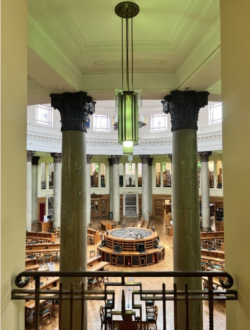Beginning the Research Journey
This is the second blog post discussing our scholarship project titled ‘Digital Language Education – A Language Centre Case Study’.
Beginning the literature review process is an essential part of any research project, and it involves an in-depth analysis of the existing literature on a particular topic. Despite being a crucial part of research, writing a literature review can be a challenging task and perhaps even more so in a group project. This blog discusses some of the difficulties that we have faced beginning our literature review process for the Digital Language Education project.
One of the first challenges we encountered was defining some of the key terms within our study. Areas central to our research project include defining the term ‘practices’ and ‘digital literacy’. In educational research, ‘practices’ typically refer to the instructional strategies, methods, techniques, and approaches that practitioners use to facilitate learning. The starting point for our research sees ‘literacy as a social practice’ with different literacies associated with different contexts and literacy practices shaped by social institutions and power relationships between individuals, groups, and communities (Barton & Hamilton, 2000, p.7).
The difficulty may lie within researching practices as some researchers suggest they are not observable units of behaviour, while others argue that practices are visible (Barton & Hamilton, 2000; Jones & Hafner, 2012). This comes back to the difficulty of defining practices above and will be a key part of the literature review. We plan to observe and analyse practices in various English for Academic Purposes (EAP) contexts at the Language Centre and attempt to observe practices by using different data collection methods and triangulation of data.
After initial background reading and discussion, to frame our study we have defined Digital literacy as ‘the practices of communicating, relating, thinking, and ‘being’ associated with digital media’. This means more than just mastering the technical aspects of the different digital tools available, but also how they influence our social relationships and identities within our literacy practices (Jones & Hafner, 2012, p.14). As discussed in the first blog post, we are taking a holistic approach by analysing the effects of digitally enhanced working, language learning, and teaching at the Language Centre from the perspectives of staff, faculty, and students.
Now we just need to begin getting our ideas and understanding down on paper and work together on our understanding of the key themes to make sure we have a coherent literature review with contributions from each of the four authors. This is easier said than done and one of the major obstacles is finding enough time to sit down and reflect on the project for extended periods of time rather than a bit here and there. We have now received ethical approval, so this should add haste as we are now onto the long process of collecting data which will be the topic of our next post.
Matthew Ketteringham
Image above by Roya Alimalayeri
Project team: Denise de Pauw (Principal investigator), Michael Parkin, Roya Alimalayeri, Matthew Ketteringham (co-researchers).
References:
Barton, D. and Hamilton, M. 2000. Chapter 1: Literacy practices In: D. Barton, M. Hamilton and R. Ivanič, eds. Situated literacies: Reading and writing in context. London: Routledge, pp.7–15.
Jones, & Hafner, C. A. 2012. Understanding digital literacies: A practical introduction. Routledge.
